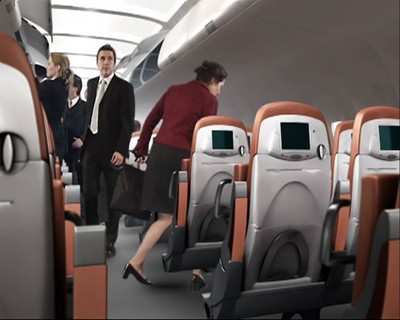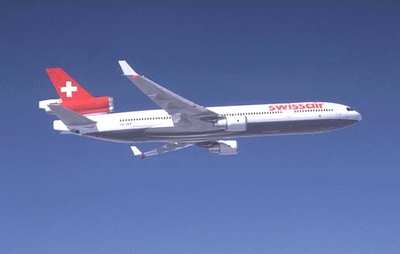Entertainment Systems Can Still Be Dangerous, Safety Advocates
Say
Despite their growing popularity, one need not look far into the
past to see an example of what can go wrong with inflight
entertainment (IFE) systems onboard commercial airliners. It was
just under 11 years ago that Swissair Flight 111 went into the
Atlantic near Nova Scotia after an electrical fire broke out in the
cabin, caused by arcing in the system's wiring.

While airlines and manufacturers say modern systems are far
safer today than those onboard the
Swissair MD-11 that crashed September 2, 1998,
claiming all 229 people onboard... there are those who say not
enough has been done to prevent another calamity.
Some of those names are also familiar. Former Department of
Transportation IG Mary Schiavo is among critics who claim problems
still exist with the need for extensive electrical wiring
throughout passenger airliner cabins to support the increasingly
complex IFE systems.
"We could be setting ourselves up for a déjà vu
disaster," Schiavo told USA Today.
 Others are concerned that modern systems have migrated from a
handful of television monitors mounted overhead, to flat-screens in
individual seat headrests. Not only does that bring the equipment
needed to support the systems closer to passengers, they also
require a lot more wiring. Low-cost carrier JetBlue Airways, an
early-adopter of seat-mounted IFE, notes each system adds over two
miles of wiring to the inside of one if its Airbus A320s.
Others are concerned that modern systems have migrated from a
handful of television monitors mounted overhead, to flat-screens in
individual seat headrests. Not only does that bring the equipment
needed to support the systems closer to passengers, they also
require a lot more wiring. Low-cost carrier JetBlue Airways, an
early-adopter of seat-mounted IFE, notes each system adds over two
miles of wiring to the inside of one if its Airbus A320s.
"Any time more wiring is added to an aircraft, there is more
chance for something to go wrong," Schiavo says.
Passengers notice the potential for problems, too. Ron Goltsch,
an electrical engineer who often travels on Continental Airlines,
recently noted the control equipment under each seat's armrest
generates between 105-115 degrees of heat when not in use.
"That's not a good thing," Goltsch says. "Heat and electronics
don't mix well."
FAA data indicates that combination continues to cause problems,
though relatively infrequently. USA Today noted four incidents last
year in which an "electrical smell" or smoke was detected coming
from inflight entertainment systems; from 1998 through last year,
hundreds of similar cases were reported, though just 44 were later
found to be the blame of IFE equipment.
The FAA, aircraft manufacturers, and airlines
say those isolated cases shouldn't be cause for alarm. In addition
to advances made in wiring and data transfer technologies since the
Swissair accident, they also note items like cabin insulation
material have been replaced by less-flammable materials.
"The FAA takes all reports of smoke and fires very seriously,"
agency spokesman Les Dorr said. "We ensure all necessary actions
are taken to determine the event's root cause and to identify any
needed safety actions."
That proactive approach echoes statements by the two largest
manufacturers of commercial planes, Boeing and Airbus. "Although
manufacturers try to design and produce systems that will not fail,
real life shows that it may not always be the case," reads a
statement from the latter. "What is important, therefore, is the
ability of the system to detect an anomaly and to prevent it from
getting worse."

One thing seems clear -- IFE isn't going away anytime soon.
While traditionalists argue a good book is all the inflight
entertainment they need, many passengers at least take their iPod
or laptop computers onboard. When similar systems are already
installed at their seats, most passengers use them.
 ANN's Daily Aero-Linx (04.16.24)
ANN's Daily Aero-Linx (04.16.24) Aero-News: Quote of the Day (04.16.24)
Aero-News: Quote of the Day (04.16.24) Airborne 04.10.24: SnF24!, A50 Heritage Reveal, HeliCycle!, Montaer MC-01
Airborne 04.10.24: SnF24!, A50 Heritage Reveal, HeliCycle!, Montaer MC-01 Airborne 04.12.24: SnF24!, G100UL Is Here, Holy Micro, Plane Tags
Airborne 04.12.24: SnF24!, G100UL Is Here, Holy Micro, Plane Tags Airborne-Flight Training 04.17.24: Feds Need Controllers, Spirit Delay, Redbird
Airborne-Flight Training 04.17.24: Feds Need Controllers, Spirit Delay, Redbird





